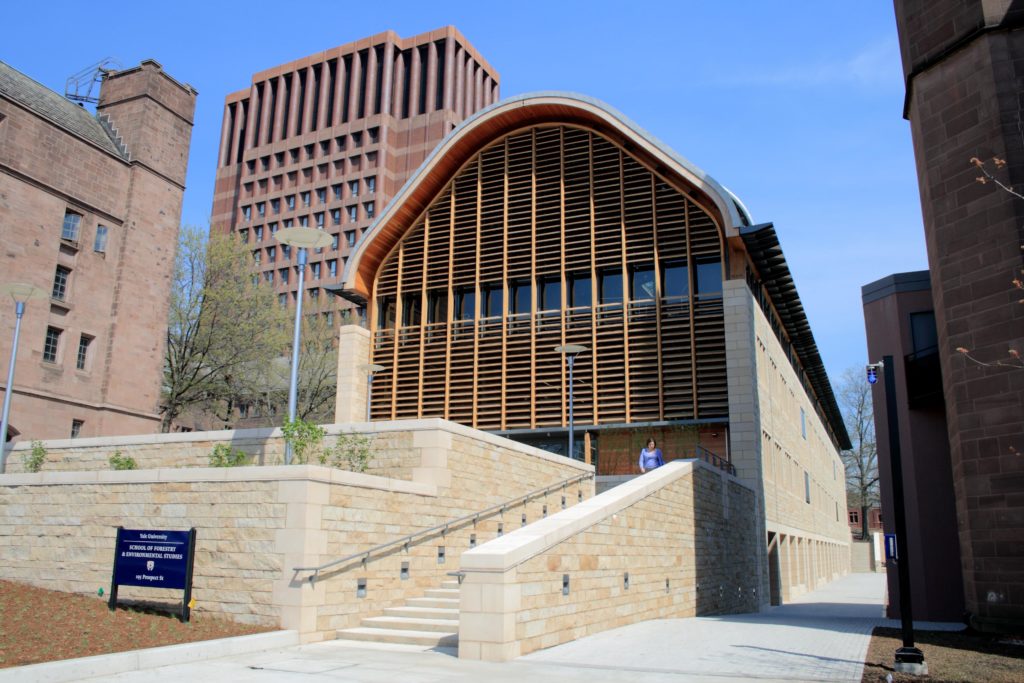Yale launches Carbon Capture Research Center with $100 million donation from FedEx
FedEx’s donation will help fund research at the Yale School of the Environment focused on developing natural solutions to reduce atmospheric carbon.

Wikimedia Commons
A $100 million donation from FedEx will help fund Yale’s new Planetary Solutions Project through the launch of the Center for Natural Carbon Capture, which will focus on the development of interdisciplinary natural solutions to reduce atmospheric carbon levels.
The Center for Natural Carbon Capture is part of Yale’s multidisciplinary Planetary Solutions Project, a broad effort concerned with the enhancement of collaborative research to address climate change issues. The center will specifically focus on the reduction of net greenhouse gas emissions by developing strategies to increase natural carbon storage processes such as photosynthesis. With this donation from FedEx, Yale plans to support faculty, postdoctoral fellows and graduate students at the School of the Environment and the Faculty of Arts and Sciences, allocate additional funding for research and cutting-edge instrumentation and support outreach for the Yale Environmental Leadership and Training Initiative.
The center is a key aspect of Yale’s efforts to support a more sustainable future and FedEx’s goal to reach carbon neutrality by 2040. Aside from its financial contribution to Yale and a periodic progress report on the project, FedEx will have no further involvement in the research conducted at the center, according to Frederick W. Smith ’66, chairman and CEO of FedEx.
“The planetary solutions project is designed to be a part of Yale far into the future, and it is unfolding as we speak with hundreds of faculty participating and many projects being proposed,” University President Peter Salovey told the News. “An incredibly important pillar within Planetary Solutions is this focus on natural carbon capture and the partnership with FedEx on research and solutions in that area.”
According to Indy Burke, dean of the Yale School of the Environment, greenhouse gas emissions are at the forefront of the current climate crisis, especially carbon dioxide from fossil fuel use. Without immediate intervention, Burke said, the consequences of climate change will be irreparable. Burke added that emissions reduction is crucial but not sufficient to reduce atmospheric carbon levels and that there are other ways to combat this problem.
Natural processes exist that draw out carbon dioxide from the atmosphere and sequestrate it in plants, soil and rocks. The Center for Natural Carbon Capture strives to better understand how these processes can be enhanced to effectively decrease greenhouse gas emissions.
The center will focus on developing an array of natural strategies to improve carbon sequestration, the process of capturing and storing carbon dioxide from the atmosphere. In the short term, Yale plans to capitalize on its research on these topics and accelerate it. In the long term, the University plans to continue scaling up its efforts to involve more people in the projects and eventually implement the strategies they develop.
According to Burke, researchers at the Center for Natural Carbon Capture plan to conduct applied research to identify solutions in three areas.
Ecosystems are one area of focus, and research on this subject will be based upon the natural process of photosynthesis, which can store carbon rapidly. Researchers will also investigate potential solutions in geology, as rocks offer near-permanent storage of carbon. Finally, they will look into engineered solutions that can capture carbon dioxide from the atmosphere and convert it into fuel, recyclable plastic, building materials and other products.
FedEx’s donation is part of the company’s $2 billion initiative to support efforts in vehicular electrification, sustainable energy and carbon sequestration.
“We’re hopeful that some of the work that Yale School of [the Environment and by Faculty of Arts and Sciences] does has some relatively near term solutions for natural carbon sequestration to offset aviation emissions,’ Smith said. ‘We’re hopeful that other people in the industry and other institutions or individuals will also join in [on this effort and make] contributions to the Yale School of [the Environment and the Faculty of Arts and Sciences] to fund research.”
At the moment, faculty within the School of the Environment, the Earth and Planetary Sciences Department, the Ecology and Evolutionary Biology Department, the Chemical and Environmental Engineering Department and other chemistry departments are working on developing these natural carbon sequestration solutions as a part of the Planetary Solutions Project,’ according to University Provost Scott Strobel. Their efforts will now be supported by the FedEx donation, as they continue to do this research as a part of the Center for Natural Carbon Capture.
Salovey said that Yale has been successful at safely opening laboratories during the pandemic, with social distancing, mask mandates and additional protocols in place. He said that despite the current challenges, a lot can be done on the research aspect of the project and everything will be made easier once public health conditions improve.
Still, Strobel pointed out that COVID-19 has hindered researchers’ ability to conduct field work, which is a key aspect of the Center for Natural Carbon Capture’s projects.
“One of the places that we have particular challenges with is travel and field work and getting to the field,” Strobel told the News. “So, we can get people into the labs, but we’re struggling a bit to get people into the field.”
The Planetary Solutions Project was officially launched in December 2020.
Nicole Rodriguez | nicole.rodriguez.nr444@yale.edu
Correction, Mar. 10: A previous version of this article incorrectly stated that the donation from FedEx would be used to support faculty, postdoctoral fellows and graduate students only at the School of the Environment. It has been updated to say that it will also support other members of the Faculty of Arts and Sciences.
Correction, Mar. 10: A quote by Frederick W. Smith, chairman and CEO of FedEx, has been corrected to state that the work that has been and will be done on carbon sequestration solutions has been conducted by others in the Faculty of Arts and Sciences, not just at the School of the Environment. The source originally provided the News with incorrect information.
Correction, Mar. 10: A quote by University Provost Scott Strobel has been corrected to include the Ecology and Evolutionary Biology Department in the list of places where faculty are currently researching natural carbon sequestration methods. The source originally provided the News with incorrect information.










